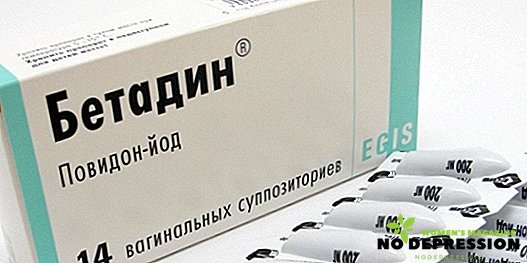This drug is a powerful disinfectant and antiseptic, which is extremely effective against viruses, fungi, E. coli and other pathogens of pathological infections.

Composition and pharmacological action
Betadine is commercially available in the form of an elongated brown suppository for intravaginal use. One candle contains:
- 200 mg of povidone-iodine (corresponding to 24 mg of iodine) - the main substance;
- polyethylene glycol is an auxiliary substance.
In pharmacies, you can find Betadine in packs with 1-2 blisters, each with 7 suppositories.
Betadine is introduced into the vagina and is actively beginning to decompose. During this, iodine gets into the tissue, actively destroying all harmful microorganisms, viruses and fungi.
Povidone-iodine acts simply: its molecules bind to proteins of infectious agents and this leads to their coagulation and death.
Since povidone-iodine molecules are large enough in size, they are not immediately absorbed into the blood and their action is local. The active substance does not interact with mucous membranes with vaginal administration of suppositories.
Despite the fact that the drug molecules do not penetrate very deep into the tissues, its therapeutic effect persists for a longer period due to its slow release. The drug is both:
- antiseptic;
- disinfectant;
- antifungal;
- antiprotozoan action.
The drug does not have a toxic effect, but its use is not recommended without prescription.
Indications and contraindications
Since Betadine suppositories are a broad spectrum antimicrobial agent, it is effective against all pathogens of infectious diseases and is used for the local treatment of several diseases at once:
- acute or chronic vaginitis;
- vaginosis, the causative agent of which is the bacterium Gardnerella vaginalis;
- candidiasis;
- vaginal infections after steroid or antibiotic therapy.
It is also often used as antiseptic prophylaxis before vaginal interventions (surgical or diagnostic).

Contraindications to the reception of these suppositories are:
- allergy to iodine or polyethylene glycol;
- the patient has a dysfunction of the thyroid gland;
- diagnosed with thyroid adenoma or herpetiform dermatitis dermatitis.
The drug should also not be taken simultaneously with the use of radioactive iodine as a chemotherapy against cancer.
Instructions for use in gynecology
Betadine candles are used only inside the vagina once a day at night. The course of treatment is usually one week, after which it is recommended to take a break.
If the drug was prescribed as a medicine for acute or chronic infection, the course may be increased to 2 weeks. With acute vaginitis - candles are recommended to be put 2 times a day for one week, and for chronic vaginitis - once a day for two weeks.
Before the introduction of the suppository, it is recommended to slightly wet it with warm water so that the administration is painless. The introduction procedure is simple:
- carry out hygiene procedures (take a shower and wash thoroughly);
- must lie on the bed;
- place a small cushion or pillow under the lower back;
- spread wide legs to the side;
- insert a candle into the vagina.
If Betadine is used as a prophylactic or in the presence of complications (infectious or inflammatory) during or after gynecological interventions, then suppositories are used once a day for a night every day for 5 days after the procedure. May be appointed before the gynecological intervention in a different scheme, which must be prescribed by the attending physician.
During the use of suppositories, the use of pads is recommended for hygiene purposes, since residues from the vagina can be released.
A characteristic feature of the drug is its use regardless of menstruation (can be used during bleeding).
If during the week after treatment, worsening of the symptoms of the disease and the lack of improvement in the general condition were noticed, then you should consult a doctor to correct the treatment or to assign a second course of the medicinal substance.
Use during pregnancy and after childbirth
Since the active substance of the drug Povidone has no teratogenic effects, the use of Betadine suppositories during pregnancy is possible only in the first trimester of pregnancy, if the potential benefit for the mother is greater than the possible risk for the child. The assessment is carried out by a doctor, taking into account all the features and indications.
Once the pregnancy has passed the 3-month mark, the use of candles is not recommended. The drug may be prescribed only in a special case and only with the permission of the attending physician and gynecologist.
During the reception, doctors are obliged to monitor the child’s condition and the mother’s thyroid function.
During the period of lactation, the use of the drug is also prohibited and can only be allowed if it is strictly necessary. In case of taking candles, breastfeeding should be replaced with artificial.
Although Povidone-Iodine does not have teratogenic effects, iodine, which is absorbed into the mother’s tissue, can pass through the placenta.
He can also get into the body of the baby through breast milk, which is why before taking the drug, you should make sure that it is necessary for the mother and get permission.
Side effects, overdose
The composition of the drug makes it quite easy to assimilate, without irritating effects and side effects. According to its properties, Povidone-Iodine has a much less irritating effect than concentrated ordinary iodine, but can still cause local irritation. Side effects of drugs also include:
- contact dermatitis;
- itching;
- allergic reactions;
- negative effects on sperm.
If the patient has some of these symptoms, you should stop taking the medicine and contact your doctor. Due to the negative effect of iodine on spermatozoa, it should not be used during pregnancy planning or the direct conception period.

An overdose of the drug is possible with repeated use of povidone-iodine, as well as oral suppositories. In the second case, acute intoxication may begin with the following symptoms:
- metallic taste;
- increased salivation;
- burning or pain in the nasopharynx;
- eye irritation and swelling;
- skin manifestations;
- disorders of the gastrointestinal tract;
- diarrhea;
- labored breathing;
- pulmonary edema;
- metabolic disorder;
- impaired renal function.
If you use the drug for a long time without interruption, dysfunction of the thyroid gland and subsequent problems may occur. If an overdose is suspected, you should immediately consult a doctor or call an ambulance.
Once the drug has been accidentally swallowed, food should be ingested, containing a large amount of starch or protein (dissolving large amounts of starch in water or milk) and immediately go to the emergency room of the nearest hospital.
Special instructions and interaction with other medicines
The main substance of candles Betadine Povidone-iodine is incompatible with other disinfectants and antiseptics:
- hydrogen peroxide or other oxidizing agents
- salicylic acid,
- salts of mercury and bismuth,
- enzyme ointment
- salts of alkaloids,
- alkali.
As for special instructions, they can be divided into a separate list:
- If the patient has blood or purulent discharge, then these factors reduce the antimicrobial effect of the drug;
- The oxidative properties of a substance may give false positive results from some studies;
- If the patient has a disruption of the thyroid, the medication can be used only as directed by the doctor;
- With a history of renal failure, suppositories should also be used with caution;
- It is not recommended for use in patients who already use lithium preparations;
- Betadine is not recommended for use in children under 8 years old;
- Virgins should replace candles with a different kind of medicine with Povidone-iodine or use caution when injecting;
- It is possible to dye the skin a brownish tint, but it is easily stopped with warm water and soap.
Price and analogues
Betadine can be purchased at any certified pharmacy at prices ranging from 370 to 450 rubles per pack with one blister. Analogues of the drug are:
- Iodoxide - from 248 to 300 rubles per pack;
- Povidone-Iodine - from 400 rubles per pack;
- Jodosept - from 140 rubles per pack.
Reviews
A year ago, I started having inflammation, but because of fear and reluctance I didn’t go to the doctor for a long time. The result was sad - neglected inflammation and the diagnosis of chronic vaginitis. There was constant discomfort in the vagina, pain in the abdomen and in the small pelvis.
The doctor looked, scolded, and appointed Betadine in the candlelight. Put in for 2 weeks one candle at night. I did not observe any side effects. The only negative is the discharge of candle residues in the morning, but this problem is solved easily by daily pads. Now the state of health is good, completely healthy, the smear results are excellent.
Zoya, 32, Moscow
There was an operation to remove the threads after cesarean, which did not dissolve. Before the operation, my gynecologist examined me, took a smear and it turned out that I had trichomoniasis. Assign me candles Betaine for 2 weeks. In the first couple of days she felt a slight itch, but he quickly passed. After the course, everything returned to normal, the tests were excellent and I had a planned operation.
Olga, 27 years old, Voronezh
I had to remove the polyps and as a prophylaxis I was prescribed Betadine in candles. Put them a week before the operation and a week after. Tingled lightly in the vagina, but there were no more side effects. After that, Betadine was prescribed several more times as a remedy with fungi and bacteria. Treatment is happy.
Valentina, 37 years old, Samara
Additional information about the drug can be found in the following video.












